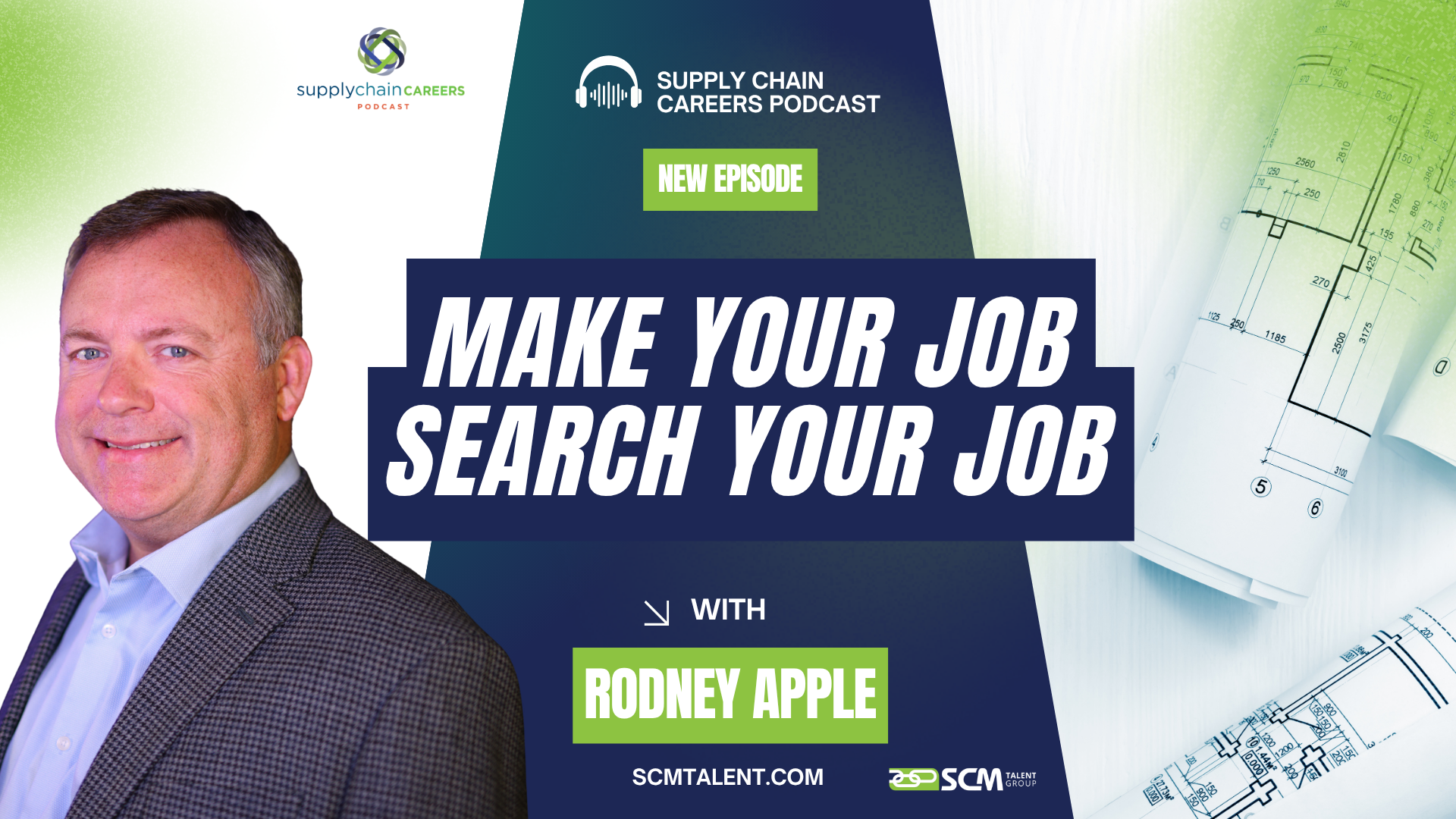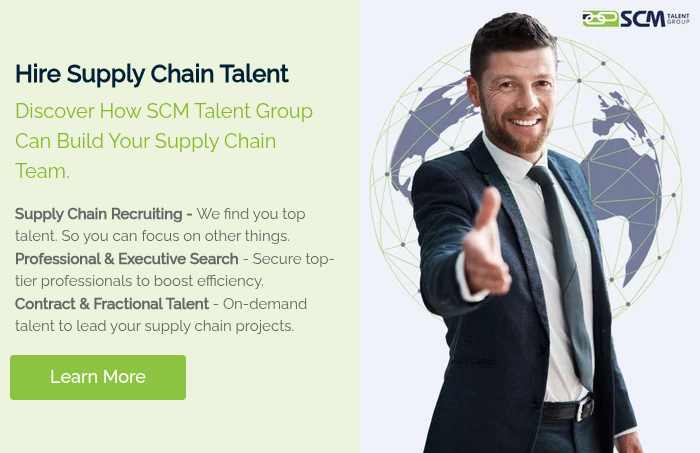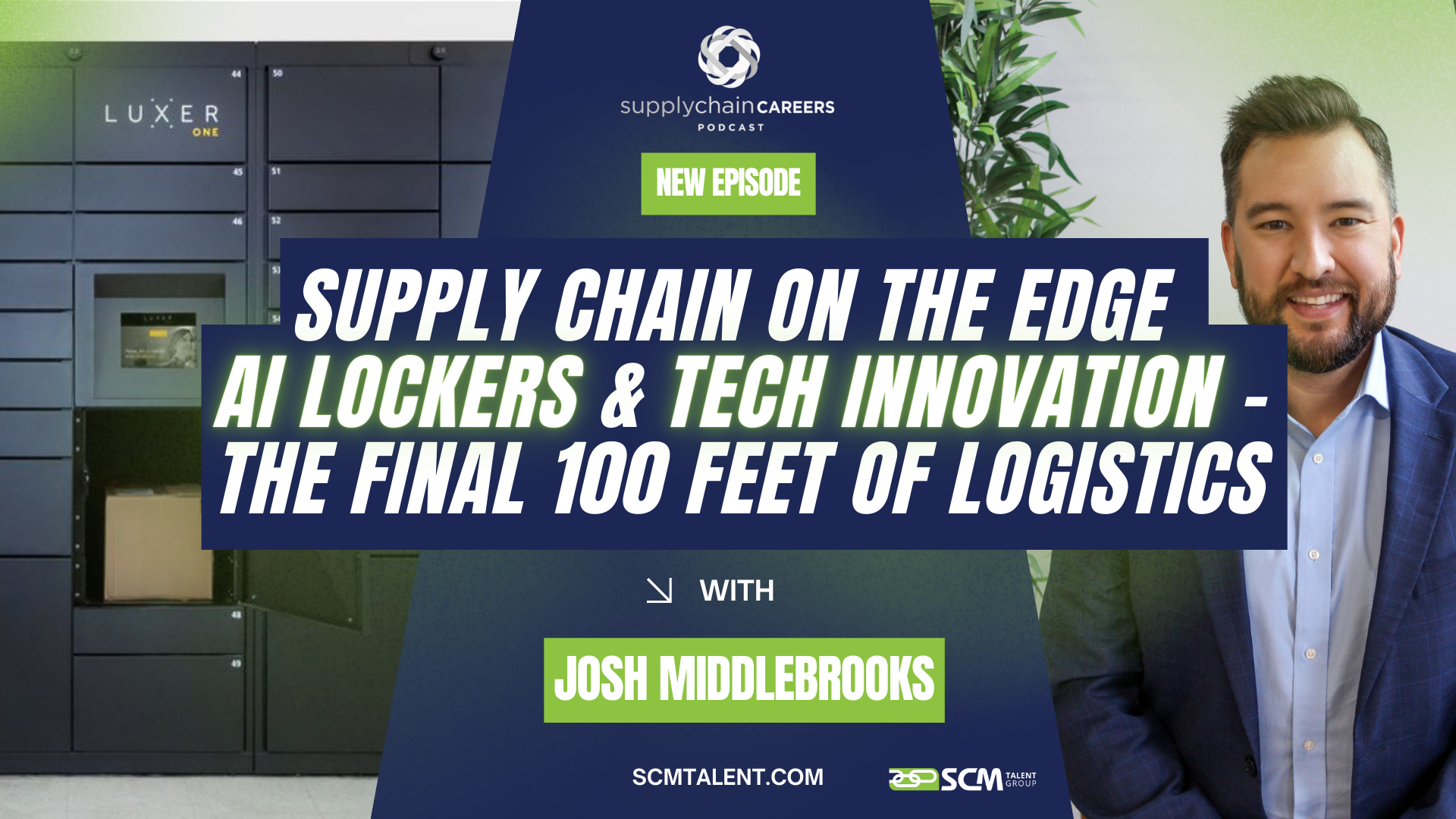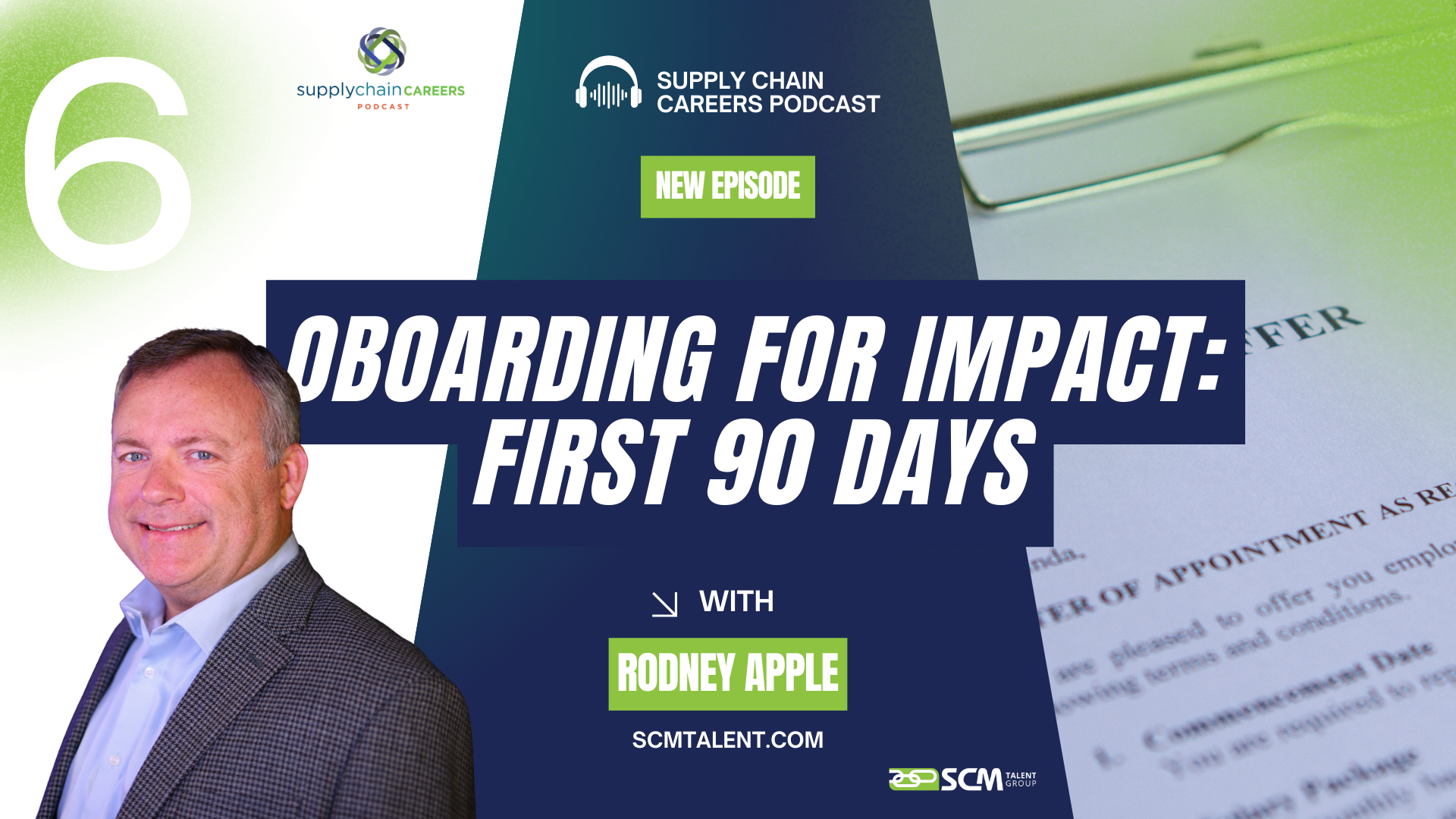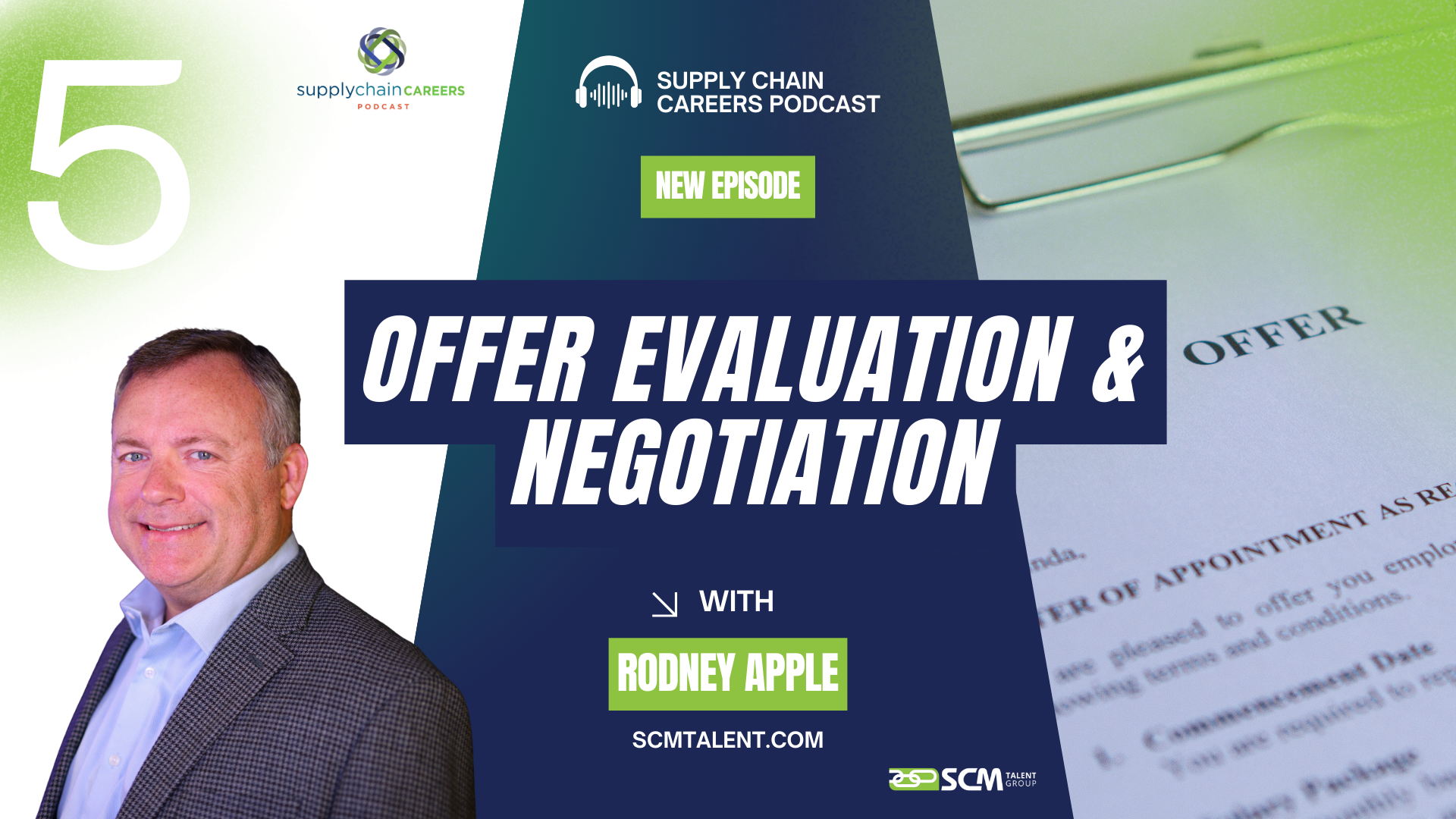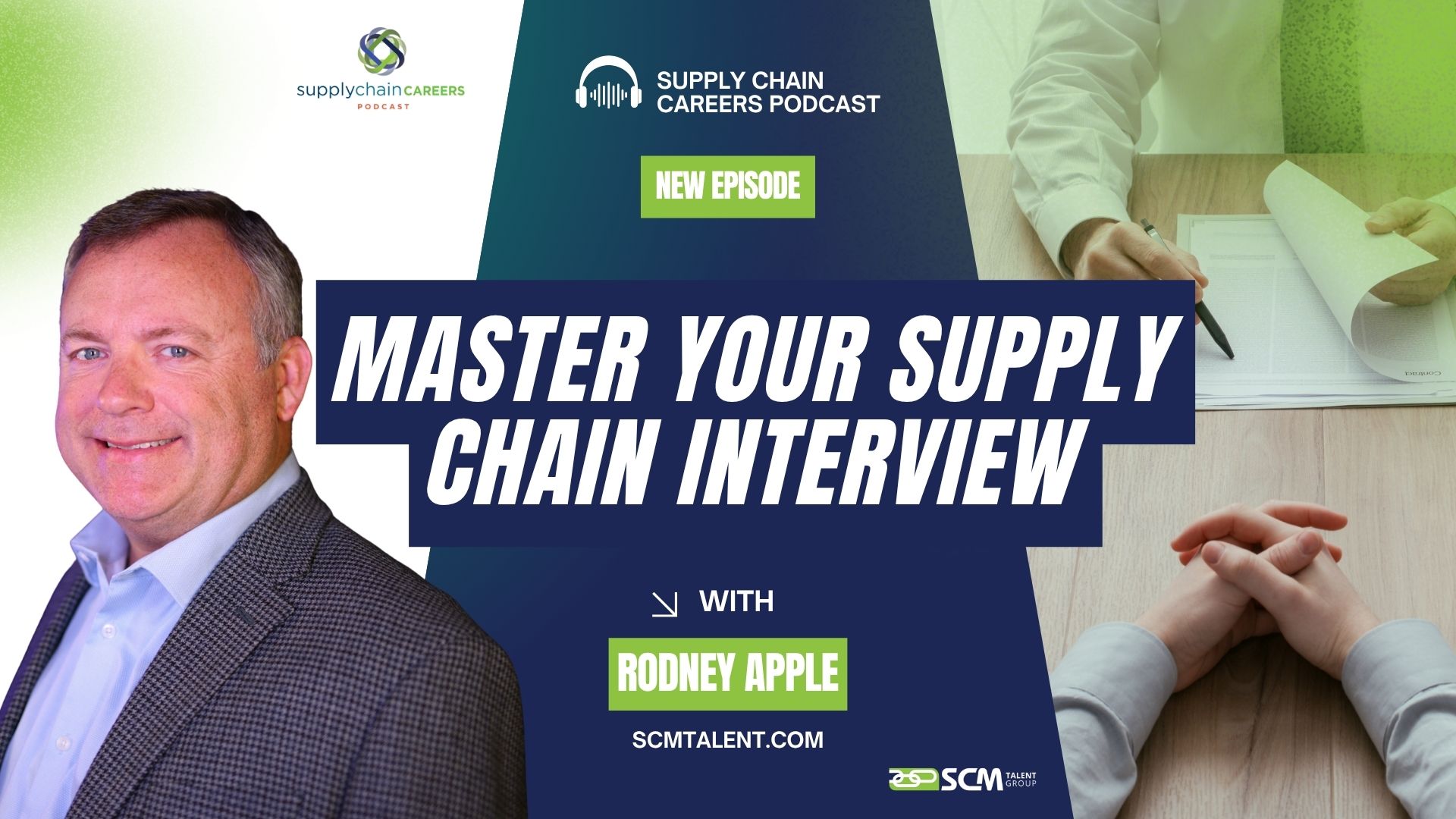Supply Chain Career Catalyst: Episode 3
Rodney Apple: [00:00:00] Welcome back to the Supply Chain Career Catalyst podcast. I’m Rodney Apple. I’m joined by my co-host Chris Gaffney and Mike Ogle. If you’ve been following along with this new series, episode one focuses on reflection and self-assessment to help define the type of work and the environments where you thrive.
In episode two, we dived into the myriad of supply chain career paths crossing over the different functional roles covering the industry segments and the company types helping you. Chart your ideal path forward. And today in episode three, we’re gonna move into the execution mode. This episode is all about building a job search strategy that keeps you organized, motivated, and focused so you can land on the right role faster and avoid costly mistakes.
Thanks, Rodney. As I teach my students in my operations management classes or my supply chain classes, you should never run a complex multi-step process [00:01:00] without a strategy or a plan or without metrics or KPIs or some kind of risk assessment and contingencies, knowing that stuff happens along the way.
Mike Ogle: So it’s going to be the same with your job search. Your plan is going to give you three things. So one, it’s gonna give you discipline, the discipline that helps you avoid drifting wandering. That helps you keep your focus on the goal and follow the path that you’ve laid out, or take the alternate forks that might be necessary as stuff happens.
Second, you’re going to get measurable progress. Those metrics or KPIs let you know how your search is progressing so you can know what’s working, what isn’t, and adjust that plan. And three, you get better decision making so you don’t just randomly apply to all the matching keywords or that you hopefully don’t pursue or follow up on or accept something just because you’re tired of waiting or you lost your focus.
Your plan will [00:02:00] help you guide you through what could be a lot of sporadic seeming activity. To find, apply for, interview, for, and land that job that meets your planned goals. So read it, put one together and stick to it.
Chris Gaffney: Yeah. I think, Mike, the, the value of structure is clear and I have seen, and I have experienced what it looks like when you don’t have structure in your plan.
We’ve talked before that this can be an emotional process for people and the structure counteracts the emotion. Emotion should play an appropriate role, but not an over-indexed role. I think it also needs to be methodical, right? We have a number of folks in the market now who are in the market.
For reasons not of their own choosing and their job search has to become their job. And so having structure, having a [00:03:00] plan for follow up, having a tracking system, having a methodical approach to how you target companies, how you track into networking connections that can help you get. Into or access to a company those steps?
I think they do a couple of things. They make sure you’re efficient. They I think they help you reduce your anxiety in a potentially anxious situation. And they set you up to be effective both in getting access to roles and then when you get access bringing your best to the table to give yourself a shot to compete for a job.
Rodney Apple: Chris, those are very good points. You certainly want to avoid having a. Lack usual plan. I see a lot of people that make the mistake of just applying to jobs spraying and praying as we call it. And that can lead to extreme frustration and anxiety. And you’ve gotta go above and beyond these days [00:04:00] to land the right job.
And I think it’s really important to point out that, networking is still paramount and that’s where the magic occurs. And so you want to have a very laser-like approach and be thinking of, the types of companies that you’re gonna apply to with as it relates to your job search strategy.
And so let’s cover those core components. First thing you’re gonna want to do is put pen to paper. You start out with, now that you know what kind of roles you’re gonna apply to and you’ve done some research on the companies, I think it’s very important to, to. Lay that action plan in place.
What am I gonna do on a daily, weekly, and monthly basis? And so I recommend starting small less, less is more. Put together a target list of companies. You can’t have hundreds of companies on a list. You’re gonna be spending in circles. And it’s best to start with a smaller list. It’s a dynamic list.
I recommend maybe 25 to, to 50 [00:05:00] companies. Start out, researching look and see if they have openings online. Yes, you absolutely wanna check the box before you start doing any kind of networking or outreach and list those companies out. And then check their LinkedIn pages, check their websites, see if they have any openings.
And that’s gonna be the starting place.
Chris Gaffney: Yeah I’ll build onto that. And I do think. Now, and you highlighted it, from a LinkedIn standpoint, it, it’s clear to me now when you target the company and you see a potential opening, a part of that process is to figure out where do I have a first or second tier connection into that company?
And when we were at Koch, one of the main things that, you know, that I coached people. In any company was find out somebody on the inside who can figure out who the manager, is for that opening. And then backtrack and say, who do we know who knows that manager? So [00:06:00] that you can get some.
Access to the role outside of the traditional process. I think that’s so much more important today. So I think that’s a key part. That’s hard and that’s work. It’s leg work, detective work, going through your network to get there. But I think it makes a difference. I think we see a high percentage of roles filled by somebody who has been referenced as opposed to somebody who’s just come in off the stack.
Mike Ogle: Yeah, that’s great Chris. After you, you get this list of companies and you dive into your network. Something I always tell my students is that I hope you remember a few topics, techniques, and tools while you’re in my class, but you really need to realize that one of the most important career long resources you have is that network, how you grow it, feed it, maintain it.
Of course it’s best to have a healthy one that you’ve maintained prior to your job search, but at this point, get those conversations going and make sure the people that you know, understand your situation where you want to be headed with your [00:07:00] career and find out where they’ve got connections, at some of those companies.
What do you know, what do you think about them? And it will spur their thought and get them involved. One of the things that that we try to do. Is make sure that people fill out a spreadsheet, or some type of job tracking system. It doesn’t have to be too formal. It’s great if there’s some tools that you find that can really do it well, you get names and titles and companies how you know, who you know, who do they know a little bit of their history, some common ground, and some next steps on being able to maintain those kinds of contacts.
It includes recruiters, alumni, past coworkers and peers, just. Think of all the ways that you can make a connection. You do informational types of interviews to be able to understand what people really know and make sure when you reach out that you use some clear and strong personalization rather than making something sound like a form letter or a [00:08:00] mass email.
That’s my advice on the networking side.
Chris Gaffney: A step that I’ve seen Mike, that I think plays right into this, and I actually experienced this when I was doing the consulting gig, was leverage LinkedIn for everything it’s worth. Go ahead and download your contacts. There’s plenty of videos on YouTube that explain how to do it.
It takes about five minutes to make the request and then the request comes, shows up in your inbox a few hours later in an Excel format and. I advise people to grade their contacts in kind of a level one, level two, level three. The level one are people who, if you reach out to them, they’re gonna come back to you same day.
Okay. And the level two people might come back to you in a week, and the level three people may eventually come back to you or not. That level one list, I typically say, depending on who you are and where you are in your career, is between 50 and 200 people. [00:09:00] Those are the people who will be in your corner when you are in the search mode, okay?
Whether you’re in a spot because you are out of a role whether you are very unhappy in a role and or uncomfortable about your future in a role. Those are the people who say, let’s get on the phone asap, today, tomorrow, the next day, they will give you coaching. They will support you, but most importantly, they will then have your name on their mind and they will be the ones who will be listening.
When they talk to the 50 to 200 people in their network and they’ll say, Hey, one of the folks that’s in my A-level network, one of my trusted folks is in the market. I think they may be a fit for your role. And I saw this in consulting. I see this in job search. I think this is probably, do 50 times 50, that’s 2,500.
Do the bigger numbers. It’s a lot that is probably. Even if it takes [00:10:00] time, right? And these searches now potentially do take time, that may be where you get your best outcomes because you’re going from your trusted network and it leveraging a broader, trusted network to get access to roles that are out there from people who care about you.
Mike Ogle: That triage sounding like kind of process, 1, 1, 2, 3, how you end up separating out the cases to understand where your attention needs to be. You can use the same thing on the companies as well. Where are your priorities, 1, 2, 3, in, in what you really want to go chase after.
And make sure that you’re not just always looking at the whole list, but you make your way through your priorities.
Chris Gaffney: Yep. And I, I think I think there’s a bridge here between this networking role, process or step and actual job interviews and, applications and interviews.
One of the things that I find is interviewing is not easy for most people, and it’s also something you don’t get a lot of practice [00:11:00] about. And we’ve talked about this idea of an. Informational interview and we use this a lot at Koch as well. We used it internally when we had somebody. Who was interested in a role that wasn’t open, right?
And time and opportunity don’t always match between you and a preferred role. And what I suggested and encouraged and supported was folks basically saying, go get in front of somebody and say, you have a role I’m interested in. It’s not open, but I’d love to talk through my background with you and get some feedback from you.
In the event that role becomes open in the future so that I can hear if there’s something I need to work on developmentally or I need to do a better job of making my case as a candidate. And you’re gonna get feedback by doing that. And I think in this interim stage where you’re starting your search, you’re starting to map out companies, you’re leveraging the network.
You could say no pressure, but can you just give me an interview, inter [00:12:00] informational interview and just give me feedback on where I sit? That’ll help you get comfortable for when the actual interview come comes up. It may also put you into the mind of that person when that role comes up. I need to put that person in my pipeline.
Six months from now when something changes, you may get that call to say, remember when we talked, we may now have something for you. So I think it serves a couple of different needs as a step in the process.
Rodney Apple: Yeah. And so the one important thing that you want to track is the jobs that you apply to. And there and I bring this up because as a as a person that sits in the supply chain recruiting seat, it’s gonna be awkward if an employer calls you or someone like myself, a recruiter calls you and you’re not able to quickly register.
Hey, I appreciate you applying to this job, and you can’t make the connection. So you want to stay highly organized on this spreadsheet. Is a good place to keep track of these. You could bookmark them. So whatever you, your [00:13:00] organizational system is keep track of the job applications that you apply to.
So if an employer does call, you can make the connection, but also we’re gonna kick it into a higher gear. You’re gonna want to, leverage LinkedIn is probably gonna be the best tool. If you’re an example, if you’re a transportation manager applying to roles of transportation, you ideally wanna figure out who is that hiring manager that you can connect to.
So track those applications and then map out through research those contacts that you’re gonna want to engage with via LinkedIn as well.
Chris Gaffney: Yeah, I would say having been in this boat a couple of times, there, there are a couple things there. And I’ve got one thought and question for you, Rodney, and then a thought for the candidates once you’re in that mill.
What is your coaching for folks around following up? Do you let it be like, Hey, don’t worry, they’re gonna get back to you, or do you, is it good or bad? Adequate to be [00:14:00] following up? Hey, I applied. I haven’t heard anything. What is your coaching for folks on that?
Rodney Apple: It’s, that’s probably the biggest question that you could ask on this title in this particular series, Chris and I’m glad you brought it up.
The follow up is. Critical. I can’t stress how important it is. You definitely want to err on the side of no follow up is not gonna get you anywhere if you’re just applying. We know that oftentimes the resume can go into the proverbial black hole. If you really want to.
To see some good results. It’s gonna come down to networking and following up. And you have to assume these days. And it depends on what level you’re at too. But no matter what, people are busy in supply chain, companies are running lean, we’re running lean over here at SM Talent Group, lots of uncertainties in the air with tariffs and things like that.
So just assume people are busy. And follow up. And there’s a right way to do it and a wrong way to do it. And the wrong way to do it is to put the person on speed, dial and call multiple times per [00:15:00] day, per week. You’ve gotta spread that out and multiple touch points. Some people are more responsive to email, some are very responsive to a LinkedIn message.
Some are. Some are more responsive to phone, and so you wanna leverage those those different ways to reach out to people to connect. And again, assume people are busy. If you don’t hear back from someone, I recommend that you try them again. Once a week. It can’t hurt to do that.
I like the idea of sending an email, let them know, Hey, if I don’t hear back I’ll try to reach you again here soon. That’s gonna be where the magic occurs. And I’m looking at too, the people right now, we’re getting a lot of people, are looking for new roles and the ones that.
Can get through. ’cause it’s impossible. Recruiters are busy. They’re getting lots of applications, but the ones that get through are the ones that follow up and it could be a second or third attempt that, that gets that result.
Mike Ogle: Yeah. And Rodney, oh, [00:16:00] go ahead Mike. I’ll follow you. Rodney, a quick question as a follow up on that.
Do you think it’s valuable for somebody, for each application to be able to have the equivalent of an elevator speech that if they get asked, so what interested you the most in this role that you’re prepared to have something that is really strong at the very beginning of a conversation, should that call come to you?
Rodney Apple: Exactly, Mike. And with AI these days you can have it review a job description and summarize what’s the most important aspects, and then you can follow that up and try to thread the needle with, how your background skills, experience qualifications, aligns with the role and what they’re seeking.
And if you can do that and convey accomplishments, value you’ve contributed to your employer, you’re more likely to get a response than something that’s a cookie cutter template.
Chris Gaffney: Now, the other point that I would make here, like I, I have been in a search where [00:17:00] the job was important to me, but it was taking time. And I think sometimes these more senior roles, they do take time. I would also say, stay productive. Obviously if you’re in a role, be productive in that role.
But also if you’re preparing for what could be a, an interview, a second interview, a third interview, the other thing I advise is be prepared. Okay? And this is where I think it’s relevant at all levels. You’ve gotta be thinking about how you’re gonna present yourself during the interview.
Anticipate questions, anticipate the type of interview that it will be and plan for all things. I’m. Very strongly suggest that folks have an inventory of their capabilities and their experiences separate from their resume. It literally is, and I, whether you could do it in a Word document or an Excel spreadsheet, is think about all the dimensions, all the technical dimensions of soft skill dimensions and lay out multiple [00:18:00] experiences.
We did situational interviews at Koch. That’s not the only way, but that. Was very helpful where you could say, situation, I was in task, I was given actions, I took results or outcome that I generated. That’s pretty. Adaptable to a lot of questions that you may get. Think about the type of questions. Now with ai, you could say, I’m interviewing for a role like this.
What are the range of questions I might get? I think the theme here is if the job is important, you gotta study for the a and you can think of all the different ways that you study and prepare for a big exam. The same analogy applies here. I think the other thing is you gotta be prepared for the positive questions and the negative questions.
Tell me about a time when things didn’t go well. That’s a tricky one, those negative questions in terms of how you answer them, but I think that level of prep is important. And I would tell you, I talked to a student this week, they saw a recruiter at lunch. Three hours later, the recruiter said, we’re doing dinner interviews.
Are you available? And you wanna be able to say [00:19:00] yes and you wanna be able to. Have your interview suit ready and you wanna be able to walk in prepared. So I just think that’s a build on this step, this part of the process.
Rodney Apple: Absolutely. That’s a great call out, Chris.
Chris Gaffney: So I guess the next section really gets to the high class part of the process is if you get an offer and when you get an offer, let’s be positive. How do you handle it? How do you process it? You may get offered the job you should have researched what the type of benefits that the company offers, but understanding the benefits as well as the salary is important as all the other elements of it, where does this role lead in, in the organization?
How do they articulate, not only you, but how this role fits in with traditional succession. I think culture, you should have done your own legwork on this. All you’re gonna get is, rainbows and unicorns if you ask about culture to the hiring manager, but that’s your work. Where [00:20:00] is the location?
Is it a location you expected? If it’s not, what are you and your family prepared to do? Who you’re working for, what’s the team, all those type of things. There’s some things that you could do offline. There’s appropriate things to ask to evaluate it. I think then, then the question, and this is where I want to talk to you, Rodney, is you know, what do you ask for in terms of time to evaluate an offer?
And kinda what steps do you suggest when somebody, depending on the type of role it is, gets an offer. Countering, not countering, all those type of things.
Rodney Apple: Chris it’s, this is the exciting part, right? But it’s also the part that you can’t afford literally to get wrong.
And back to. What you said earlier I recommend, money, salary is important and all that, but, writing this stuff down and prioritizing it if you have a spouse, a partner, a family, it’s, it becomes more important when you think [00:21:00] about benefits and things like that.
So write down, the things that are most important and I would recommend force ranking too. What’s number one, number two, number three, are you trying to get to a certain location in terms of relocation? Are you getting out of a miserable place? So culture, getting into a place that’s more fun to work.
Is it a company that’s going downhill that you. You wanna get on the other side of that into a growth opportunity where you can move up. So what are those most important things? Map it out. Force rank it. Start there. In terms of negotiation, that you’re gonna leverage that too, right?
Maybe you’re looking for more time to spend with the family, so you’ve gotta understand what’s important before you go into any kind of negotiation. So in terms of offer negotiation understand your key priorities and if it’s compensation you definitely wanna be able to articulate the value that you can deliver. It, if you don’t ask, nothing gained, if you don’t ask the question.
Understand [00:22:00] your, from a budgeting perspective where you need to be to maintain. Your lifestyle. You wanna be certainly be able to pay the bills and hit whatever your goals are on the financial side. So know what that number is when you go in I you want to engage early and often on, on compensation and and that’s gonna be your foundational baseline, right?
Anything you can get on top of that is always what I look at as gravy. And if you can’t. Negotiate what you can get on the base salary, be thinking about what’s that second bucket in terms of priority. It could be a sign on bonus. Can at least make me whole with some kind of a sign on bonus go further down the list.
Again, what are those A level items that go beyond the base salary to negotiate? I’ve also have coached. Coach candidates on. Okay. It sounds like I’m running up on the max and I understand why. What can I do beyond, this point? Could it be maybe instead of an [00:23:00] annual review, if I’m able to hit these accomplishment accomplishments by a certain timeframe, let’s say six months?
Could I be eligible for some kind of an increase then? So again, know your priorities and go down that list to see what you can trade off on the negotiation side of the house.
Chris Gaffney: I think another one here, and I’ve had this discussion with mentees and I’ve had this discussion actually with family members. This is another place to use that kind of personal board of directors We talked about, I have had job change situations where I’ve talked to my family directly about it, but I think in some cases they can be conflicted because they’re like, Ooh, you, I know you really want to do this.
And so you may or may not get the honest feedback and later on you’ll say, yeah, I didn’t think that was a great idea, but it was really important to you. Whereas if you go to your personal board of directors who care about you but can be a step removed, they may be the ones to say. I just don’t think this sounds right.
I don’t think this is enough, and or they may say, no, this is a [00:24:00] really great situation. Don’t start out on a bad foot and be negotiating hard. Make the long play. This is a great company. Demonstrate your value, kind of thing. So I definitely think this is a great place to use that neutral personal board of directors person who’s outside of your immediate family.
Rodney Apple: Yeah, that’s a great call out, Chris. At the end of the day, you’ve gotta know what your number is and you’ve gotta know what those non-negotiables are as well. And if they can’t meet you where you need to be or if they’re coming in with a low ball offer to try to save a few bucks.
That’s usually not a good sign. So to be able to sniffing out those red flags can certainly do a lot of good in the long term. And so you wanna do your homework there and definitely run this by your sounding board, your personal board of advisors is critical.
So I think it’s important to talk about the state of the market right now. It’s in flux. It’s on one hand, it’s, there’s a lot of companies that [00:25:00] are hiring and looking for talent. We’re definitely seeing that at the leadership levels as baby boomers retire and, we still have some gaps in that mid-management and up level.
On the other hand though there’s, companies are running lean and with all the uncertainties in the air, there are a lot of layoffs occurring and you have to factor that in. It’s a more competitive job market. You also have ai tools that are in the hands of job seekers.
Employers have had that for a while. They’re filtering applications by keywords. They’ve got algorithms that help force rank the applications by. By keywords that match the job description and so forth. So we’ve had that in our arsenal for a while and it’s been helpful.
But now with ai job seekers are able to use, various tools to tailor quickly tailor their resume. And in some cases you can automate that entire process of applying to jobs too, with a different AI agents. But, the key point I’m making is you have to be resilient and you have to stay focused, and you have to stay positive, [00:26:00] right? You’re gonna get rejected.
This, it’s almost like sa being in a sales role. You’re gonna have people tell you, no, people potentially hang up on you when you call in to follow up. It is just part of the process. And stay diligent. Stay positive, stay focused, maintain a positive attitude. And the follow up again is the most critical aspect of this process.
If you’re just applying and hoping that someone responds. Your job search is gonna take a long time but just know that it’s gonna take all I. Realistically and depends on what level you’re at. The higher you go up, you’re at the top of the pyramid. There’s just less opportunities, right?
Compared to the bottom of the pyramid where most of the roles are. So just know that it’s a marathon. It’s not a sprint. Networking is paramount to success. So you want to connect with potential hiring managers and companies, even honestly even peers, people that might be doing the kind of work that you’ve been doing.
If you’re, I’ll go back to the transportation manager example that I used earlier. Connect with folks in industry, get [00:27:00] out to trade shows, get out to local networking events. Doesn’t even have to be supply chain related. It’s just get out, meet people and connect work with other job seekers identify the recruiters that can help you and stay on the radar screen. That’s the advice that I have. You just don’t want to get burned out. You don’t want to get frustrated. It is a frustrating process. It’s like doing taxes. It’s one of pe you think about it as one of the most people’s least favorite thing to do but those that stay motivated and follow up and have things highly organized, that’s where you’re gonna have the most success.
Just can’t give up.
Chris Gaffney: Yeah I would add a few points here. Again, I think it’s a different circumstance. If you are in a role and it’s not ideal, that’s one set of circumstances. If you’re aspirational and you’re looking for the next big role, that’s a different set of circumstances. But if you’re out of a job that’s a totally different ballgame.
Okay. I think in the first two, you keep, knocking the ball out of the park on your current role. That’s always, job [00:28:00] one, when you are in a role regardless of the circumstances, because that’s something you’ve got, bird in the hand. If you are not in a role, it’s a very tough spot.
And I’ve been there for a short period of time and I get a good sense of what it’s like. You may not be sleeping well, you’ve got other things on your mind. I think you know the best advice I give to all those people is to make sure you’re taking care of yourself. Okay? You could define what taking care of yourself physically, mentally, spiritually looks like, but you gotta work hard on sleeping well.
You gotta work hard on eating well, you gotta be active. Because that’s something you control. And I think in one of the, in these situations you can feel like you don’t have enough control, but taking care of yourself I think is a good thing to be doing. I would emphasize a couple of the points that Rodney said.
Make sure you’re engaging in a lot of different ways. And I think those folks who are. The people who are really in your corner, [00:29:00] make sure you’re staying with them in terms of connecting with them, engaging with them, getting positive reinforcement. And again, I think if you’re out, I think you, you ought to be super creative around what you can do, what you’re willing to do.
This is the time to be also in parallel talking about interim short term assignments, little consulting projects or whatever be open. To just about anything. And I will tell you in my situation, one of the things that I did during this time, this is when I started writing down some thoughts around my perspective on the market, my space in the market, my advice it helped me stay current with which, what, what was going on.
But I also ultimately was able to use that when I got into, different interview settings because I had a current point of view in terms of what was going on out there. So just a few additional thoughts.
Rodney Apple: Yeah, that’s, those are all great points, Chris.
So this is a wrap for episode three of the Supply Chain Career Catalyst [00:30:00] podcast, where we have, so far we’ve discussed the importance of self-reflection understanding your strengths and what you don’t wanna do in terms of your career and then.
We’ve segmented into exploring all of the different opportunities that exist within supply chain when you think about functions and industries and the different types of companies, sizes and ownership. In this episode we’ve basically focused on, how to draft and develop a sound job search strategy, action plan that’s gonna yield the best results.
For episode four, we’re gonna dive into interviewing. Best practices. I like to look at that into three stages. What do I need to do to prepare before I go on the interview? What are the things I want to do during that interview? That’s gonna impress the the interview team and then the all important follow up when you get back from the interview.
When you end the interview, what do you need to do next? So we’ll cover that in episode four of the Supply Chain Career Catalyst podcast. . Be sure to subscribe to the podcast if you don’t [00:31:00] already. And if you’re on the hunt or someone’s.
That’s looking for a role. You can always refer them to SCM Talent Group for more career resources from resume optimization, the LinkedIn profile updates. We’ve got a lot of material that can help you with your own job search. So we look forward to seeing you next time. In the meantime best wishes as you embark on your own career and keep reaching for the sky.
